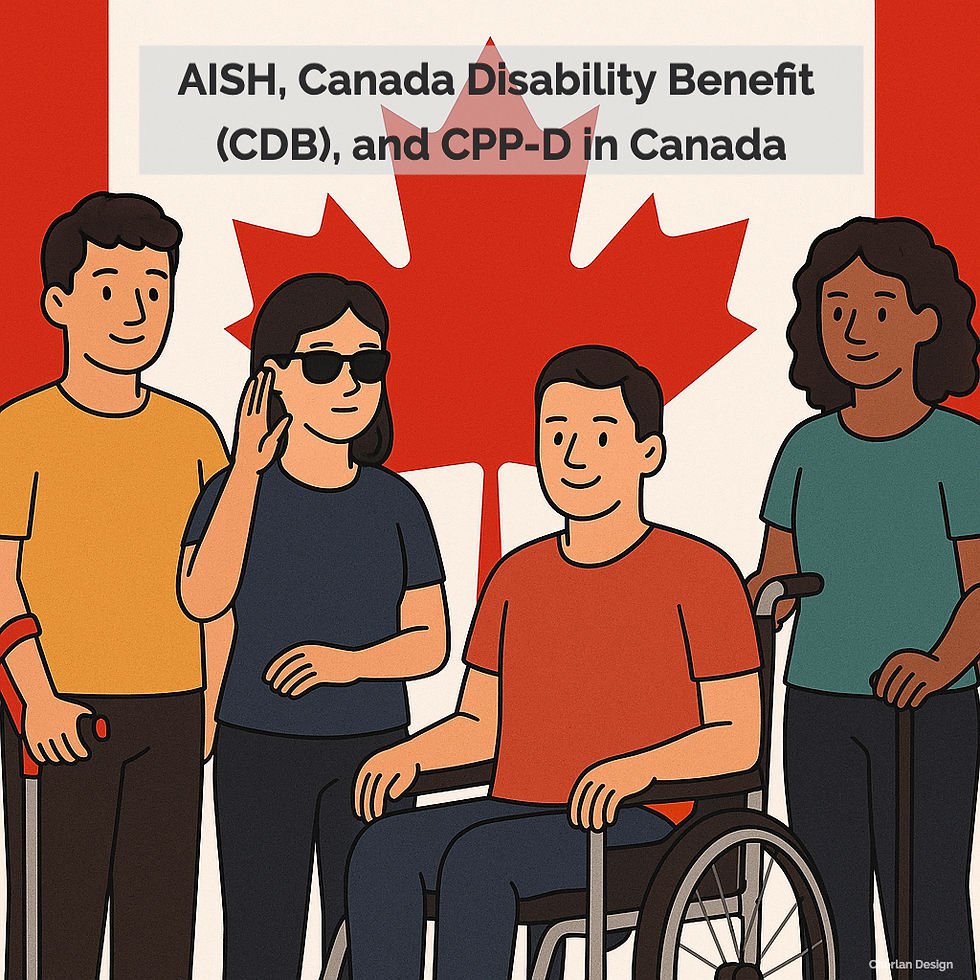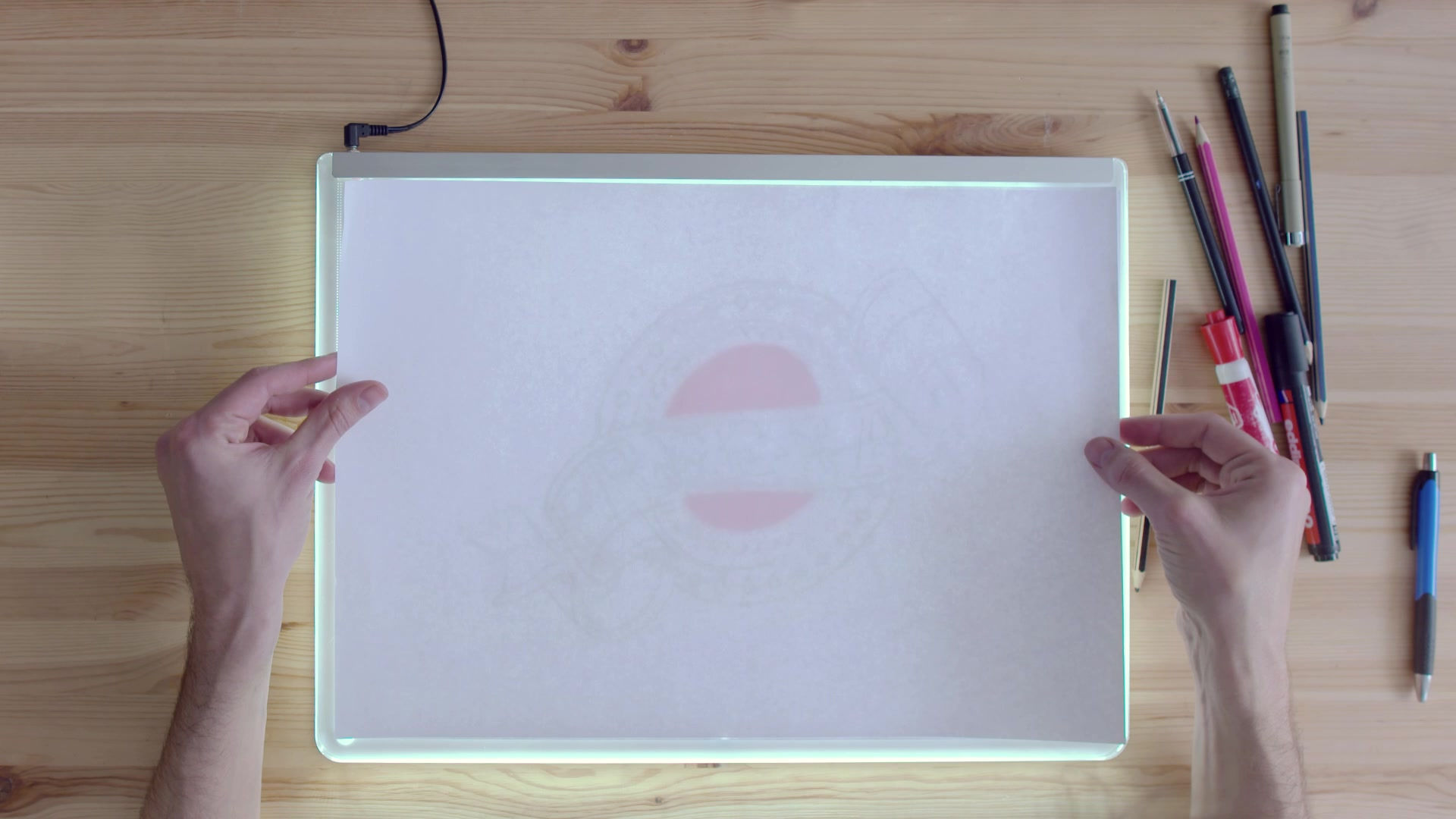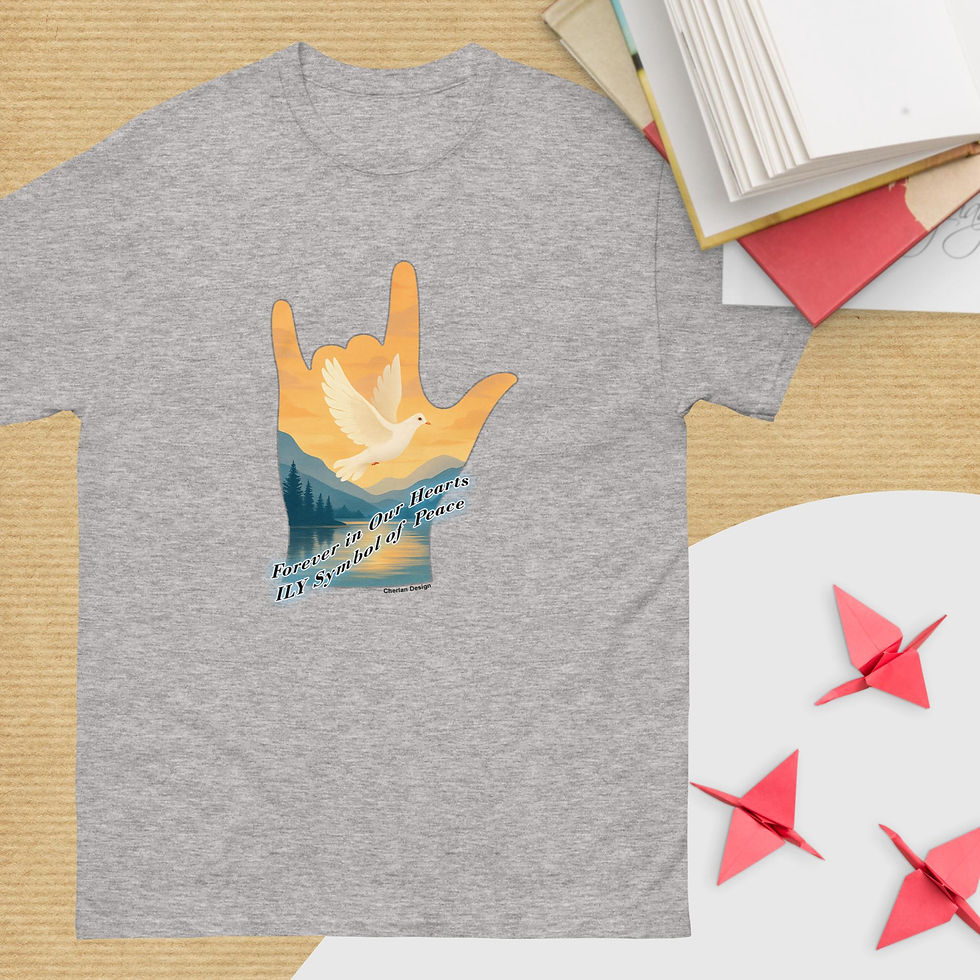Understanding AISH, Canada Disability Benefit (CDB), and CPP-D in Canada
- Cheryll Atienza

- Jul 31, 2025
- 9 min read

Living with a disability in Canada should not mean living in poverty. But sadly, many people — especially Deaf individuals and those with other disabilities — face barriers when trying to access fair financial support.
In this blog, I’ll explain three major disability benefit programs in Canada: AISH, CDB, and CPP-D.
Let’s break down what each one means, their pros and cons, and how they affect each other — especially if you’re working, Deaf, or struggling to survive financially.
What Each Program Means and Stands For
AISH (Assured Income for the Severely Handicapped)
Who runs it? Province of Alberta
What does it stand for? Financial support for Albertans who have a severe and permanent disability that stops them from working full-time.
Monthly amount: Up to ~$1,787/month (2025)
CDB (Canada Disability Benefit)
Who runs it? Government of Canada (federal)
What does it stand for? A new program started in 2025 to help low-income people with disabilities (must have the Disability Tax Credit).
Monthly amount: Up to $200/month for now (may increase later)
CPP-D (Canada Pension Plan – Disability)
Who runs it? Government of Canada (federal)
What does it stand for? Income for people who became disabled after working and paying into the Canada Pension Plan through taxes.
Monthly amount: Average ~$1,100/month, but varies
Pros and Cons of Each Program
Program | Pros | Cons |
AISH | Includes medical, dental, eye, bus pass, and rent support | Reduces when you earn income or receive CPP-D or CDB |
CDB | National support to fight poverty; no effect on provincial supports in theory | Alberta reduces AISH when you get it; amount still low ($200) |
CPP-D | Based on what you earned before your disability; may last until 65 | Getting it causes AISH to go down or stop; strict approval |
Why Does AISH Reduce When You Get CDB or CPP-D?
Alberta’s AISH program sees any money you receive from outside sources (like CDB or CPP-D) as "income." Even though CDB and CPP-D are supposed to help you, AISH will reduce your monthly amount if your total income goes above a limit.
That means:
If you get $1,100 from CPP-D, AISH will cut your support.
If you also get $200 from CDB, it adds to your income, and AISH cuts more.
This is not fair. It punishes Deaf and disabled people who are simply trying to survive.
What If You Have a Job? Will AISH, CDB, or CPP-D Be Reduced?
Yes — getting a job and earning income can affect your benefits, especially with AISH and possibly with CDB.
AISH work income rules:
You can earn up to:
$1,072/month (single)
$2,612/month (for families)before your AISH starts reducing.
Anything you earn above that will cause AISH to reduce by 50% of the extra.
Example: You earn $1,300/month workingThat’s $228 over the limit. AISH reduces by $114
Will a job affect CDB?
Possibly. The Canada Disability Benefit is for low-income individuals.
If you start earning a lot from work, your income may go above the allowed threshold, and the CDB may be reduced or stopped.
The full income rules are still being finalized.
Will a job affect CPP-D?
Yes. CPP-D is for people who cannot work regularly because of their disability.
If you go back to work full-time or earn too much, you must report it, and your CPP-D payments might stop.
For many Deaf and disabled people, jobs are hard to get due to communication barriers, discrimination, and lack of accessibility — so this feels unfair, especially when you're trying to work part-time just to survive.
What About Self-Employment? Will It Affect AISH, CDB, or CPPD?
Many Deaf and disabled individuals explore self-employment (like freelance work, online shops, art, crafts, or offering services) as a way to earn income on their own schedule, especially when traditional jobs are hard to access due to communication or physical barriers.
But… what happens to AISH, CDB, or CPP-D if you start earning money this way?
AISH and Self-Employment:
AISH allows self-employment, but you must report your monthly net income (what you earn after expenses).
You may be required to complete a self-employment income form and submit receipts or invoices.
If you earn more than the limit, AISH may reduce your payments.
If you don’t report income, AISH may see it as fraud or overpayment and could:
Stop or reduce your monthly benefits
Ask you to repay the money they gave you
Investigate your case, and you may even face penalties
CPP-D and Self-Employment:
CPP-D expects you to report any income changes.
If you start earning consistently through self-employment and don’t report, it could lead to:
Loss of benefits if you’re seen as capable of regular work
A review of your file
A request to repay past benefits (overpayment)
CDB and Self-Employment:
The Canada Disability Benefit (CDB) is income-tested.
All income, including self-employment, must be reported on your annual tax return.
If you don’t report your income or misrepresent it:
You may receive more than you’re supposed to
CRA may reassess your taxes
You could lose future payments or be required to pay it back
If You Don’t Report Self-Employment Income:
It could result in:
Overpayments
Loss of benefits
Debt owed to the government
Legal trouble or disqualification
What You Can Do:
Always report self-employment income to AISH, CRA, or Service Canada.
Keep records: invoices, receipts, and a clear summary of income and expenses.
Talk to an accountant or support worker who understands disability income rules.
Be honest and transparent — it helps protect your support and future.
What You Should Know:
You MUST report all self-employment income to AISH, CPP-D, and CRA.
Failure to report can lead to overpayments and penalties.
Always track your business expenses and income clearly — using receipts, spreadsheets, or bookkeeping software.
Consider talking to a disability income advisor or tax specialist.
Good News:
Self-employment can give you freedom, flexibility, and confidence. With proper reporting, it doesn’t mean you’ll lose all support — but it’s important to stay within income guidelines.
What If You Want to Travel Out of the Country for a Month or Two?
Many people with disabilities need a break too — just like anyone else. But leaving Canada or Alberta for a vacation can affect your benefits, depending on the program.
AISH:
If you're out of Alberta or out of Canada for more than 30 days, you must report it.
You may lose your AISH payment if you're away too long.
AISH may allow longer trips if you ask ahead and give a good reason — like medical travel — but vacations may not qualify.
CPP-D:
You can still receive CPP-D while outside Canada for short periods.
If you move away permanently or stay abroad long-term, you must notify them — it could affect your eligibility.
CDB:
CDB is tied to your Canadian residency and Disability Tax Credit.
If you're outside Canada for more than 183 days (about 6 months) in a year, you may lose eligibility.
Short vacations usually don't affect it — but always check the latest rules.
This doesn’t feel fair — people with disabilities deserve rest and freedom too. Many others with jobs can travel without penalty. Disability supports should allow for a break from stress, not punish people for needing time away.
Reminder: Before leaving Canada, always tell AISH or Service Canada. Keep proof of your return date.
What Happens If You Don’t Report Changes or Income?
If you receive benefits like AISH, Canada Disability Benefit (CDB), or CPP Disability (CPPD) and don’t report important changes, there can be serious consequences.
What You Must Report:
Starting a job or earning money (even part-time)
Receiving regular money from someone
Moving to a new address
Leaving the country for a vacation or trip
Big changes to your living situation
If you don’t report these changes:
AISH might stop your payments or demand that you pay money back (called overpayment)
CPPD could cancel your benefits if they believe you're no longer medically eligible
CDB may reduce or cancel your future benefits if your tax info doesn’t match
Always report to avoid stress or loss of benefits.
What About Gifts or E-Transfers from Family and Friends?
It’s common for family or friends to help someone pay for rent, groceries, or bills. But this can still affect your benefits.
AISH:
If someone regularly sends you money (even to help), AISH may count it as support income
AISH could reduce your monthly payment
One-time or occasional gifts are okay, but must be reported if they’re large
CPPD:
CPPD usually doesn’t reduce for gifts
But if it looks like you're being supported financially long-term, it may raise questions
CDB:
CDB is based on your tax return
Personal gifts don’t usually affect it unless they are regular and large
Tip: If someone pays your rent or sends money often, always check with AISH or Service Canada to avoid problems.
What About Birthday Gifts? Should They Affect AISH, CDB, or CPPD?
Many people receive birthday gifts — money, gift cards, or special presents — from family or friends. But if you're receiving disability benefits, it can feel confusing or unfair when even birthday gifts are questioned.
Here’s the breakdown:
AISH (Assured Income for the Severely Handicapped):
Occasional gifts, like for birthdays or holidays, are usually okay.
You should still report the gift if it’s cash and over $100 in value.
If someone gives you money often (monthly or regularly), even if it’s a “gift,” AISH may count it as income or support.
One-time birthday gifts should not reduce your AISH, as long as they’re not too large or frequent.
🔎 Tip: Gifts under $100 usually won’t impact your AISH. If it's a larger amount, it's best to contact your AISH worker just in case.
CDB (Canada Disability Benefit):
CDB is based on your income reported to the CRA (through taxes).
Birthday gifts don’t count as income on your tax return, so they should not affect your CDB.
You don’t need to report birthday gifts to CDB — just be honest when filing taxes.
Good news: Birthday gifts will not affect your CDB unless they're being given very frequently and are extremely large.
CPP-D (Canada Pension Plan Disability):
CPP-D is focused on your medical eligibility and ability to work.
Gifts (including birthday money or items) do not affect your CPP-D payments.
No need to report birthday gifts to CPP-D unless they are part of a regular support agreement.
Bottom Line:
Birthday gifts are a normal part of life.
AISH may ask about cash gifts, but one-time birthday money is usually not a problem.
CDB and CPP-D generally ignore birthday gifts unless they’re large and regular.
Still, always keep a record in case you’re asked later.
Why It Feels Unfair
Deaf and disabled people already face job barriers and high living costs. When support is reduced — or benefits are stopped for small things — it feels very unfair.
AISH reducing when CPPD or CDB are approved adds stress
Vacation rules are stricter than for people with regular jobs
Getting help from family can count against you
This is why it's important to know the rules — and speak up for better disability rights in Canada.
What Happens if There’s an Overpayment?
If AISH, CDB, or CPP-D pays you too much by mistake (or you didn’t report something), you could be asked to pay it back.
AISH: Sends a letter and can deduct money from future payments.
CPP-D: Will recover overpayments through your tax return or future CPP.
CDB: Not clear yet, but it’s likely similar to CPP.
Are AISH, CDB, and CPP-D Permanent for Life?
AISH:
Can last your whole life, as long as your disability is permanent.
You must stay in Alberta and report any changes in income, health, or work.
CDB:
Still new (2025), but expected to be ongoing yearly.
You must keep qualifying for the Disability Tax Credit (DTC) to stay eligible.
CPP-D:
Lasts until age 65, then changes to regular CPP retirement pension.
You must stay disabled and meet their rules.
What Benefits Are Covered?
AISH:
Free Alberta Health Card
Glasses, dental, prescriptions
Emergency health, hospital
Bus pass, rent help (in some cases)
CPP-D:
No extra medical coverage — only monthly payments(You still keep your regular provincial health card)
CDB:
Does not include any medical or health coverage — only financial help.
What Are the Rules & Risks?
AISH:
Must report changes in work, income, health, or living situation.
Risk of overpayment if you don’t report properly — they may ask for money back.
CDB:
Must qualify for DTC and file taxes every year.
Overpayment rules not fully clear yet (still new).
CPP-D:
Very strict medical requirements.
You must provide proof and medical records, and they review your status regularly.
What Is the Future for Deaf and Disabled Canadians?
Right now, the system needs change.
Benefits are too low.
AISH reductions hurt people who need federal help.
Deaf people face extra challenges — communication, job access, and discrimination.
But with advocacy, awareness, and voices like yours, Cheryll, change can happen.
What Are the Positives?
AISH gives medical help, stable monthly income, and support services.
CDB is a new national step to fight poverty — it’s a sign that the federal government is listening.
CPP-D helps those who worked before becoming disabled.
Which Is Best for You?
If you:
Have never worked much → AISH is best.
Worked and paid into CPP → You might get CPP-D and AISH (with reduction).
Are low-income and have the Disability Tax Credit → CDB adds extra help.
Tip:
You can apply for more than one — just know that AISH will adjust your payment.
Final Thoughts
Deaf people and others with disabilities deserve to live with dignity, not be punished for getting support. Before applying, learn your options and speak to someone who understands the system.
If you're unsure, ask for help — or reach out to your family, friends or counsellor. Let’s support each other and keep fighting for fair, accessible support for everyone.
Please share with your family and friends.
Check out more on our Instagram and Facebook: Cherlan Design
#DisabilityRights #CanadaDisabilityBenefit #AISH #CPPD #DeafAwareness #InclusionMatters #EqualAccess #AccessibilityForAll #DisabilitySupport #DisabilityAwareness #StopTheCuts #SupportNotReduce #DeafPride #DisabilityJustice #HumanRights #FairnessForAll #DisabilityStrong #ProudToBeDisabled #DisabilityInCanada #CherlanDesign




























































Comments